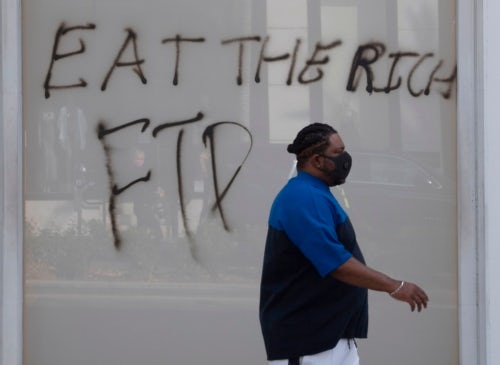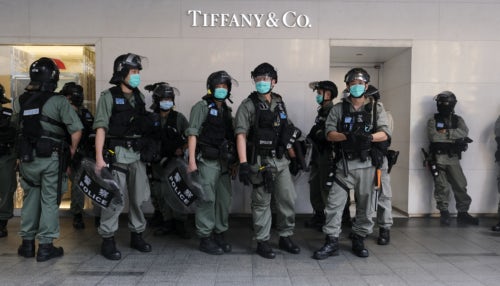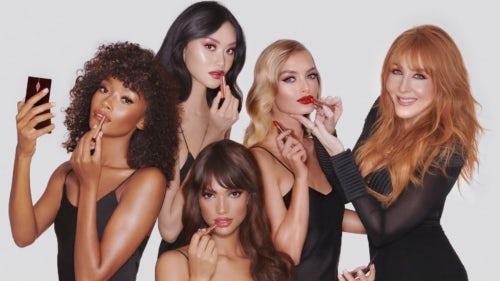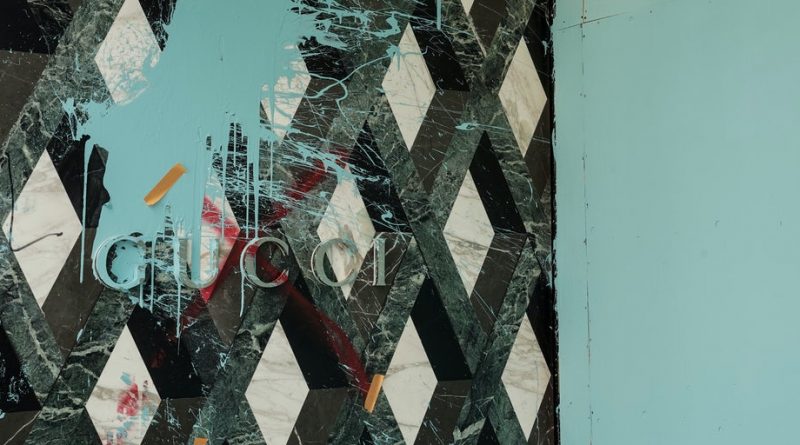Luxury’s Inequality Problem | BoF Professional, This Week in Fashion
Following the death of George Floyd, yet another senseless killing of a black man at the hands of the police, anti-racism protests have swept across the United States. Chanel, Gucci and other luxury stores in wealthy neighbourhoods from New York’s Soho to Rodeo Drive in Beverly Hills have been attacked, not only as targets for opportunistic looters but as symbols of inequality. According to local media reports, alongside “Black Lives Matter” and “I Can’t Breathe,” another slogan has been chanted in the streets and graffitied on buildings: “Eat the Rich.”
The protestors are calling for racial justice. But systemic racism has always been inextricably linked to economic oppression. In 2018, as the spoils of globalisation and technological innovation continued to accrue disproportionately to the top echelons of society, the gap between the richest and poorest American households became larger than it’s ever been since the US Census Bureau began tracking income distribution more than fifty years ago, with the Gini Index, a measure of income inequality, hitting 0.485 and black households at the bottom of the rung.
Now, at a time when more than 42 million Americans have lost their jobs to the Covid-19 crisis and its mishandling, with black incomes hit hardest, the resentment reflected in the protests is unmistakably about economic inequality as well as race.
To some degree, the luxury industry benefits from inequality. After all, luxury brands like Gucci and Louis Vuitton sell products most people can’t afford. But there’s more to the story. Contrary to popular belief, the “old money” rich don’t drive the luxury sector. The vast majority of luxury growth comes from “new money” consumers with rising incomes and newfound status to project.
“Income inequality is good for luxury goods development, as long as it is socially and politically sustainable,” explained analyst Luca Solca. “This is typically the case when successful people are seen like role models one can imitate, and when societies offer social mobility to the deserving. That was the essence of the American Dream or the Chinese Dream today.”

Graffiti on Rodeo Drive in Beverly Hills | Source: Getty Images
But if inequality becomes so deeply entrenched in society that wealth and status are simply passed from generation to generation with little hope of upward socio-economic mobility, the luxury sector will suffer. With fewer newly minted millionaires, there will simply be less demand for luxury products. And if class barriers continue to harden and resentment continues to rise, the symbolic meaning of luxury brands will change. No longer badges of success, luxury goods could become symbols of oppression.
Make no mistake, as inequality has risen, so have wages. In fact, the same year income inequality hit a record high in the US, so did median household income. But studies have shown that people may instinctively care more about relative status than absolute condition.
Social media has only exacerbated the issue, making the lifestyles of the few visible to the masses like never before, creating envy alongside admiration. The same is true of luxury goods specifically, which millions of people can now covet up close on Instagram but rarely attain.
Back in 2015, Richemont Chairman Johann Rupert was early to the observation that deepening inequality was bad for the luxury sector. Speaking at a Financial Times Business of Luxury Summit in Monaco, he predicted that advanced technology would unleash “abundance” for a small percentage of the population while killing millions of jobs and creating a massive underclass, accelerating economic inequality and leading to “envy, hatred and social warfare.”
“I don’t know what new social pact we’ll have, but we’d better find one,” Rupert declared. “Otherwise our clients will be targets. They’ll be hated, despised.”
“People with money will not wish to show it,” he continued. “If your child’s best friend’s parents go unemployed, you don’t want to buy a new car or anything showy. We are destroying the middle classes and it will affect us. And it’s unfair. So, that’s what keeps me awake at night.”
This week, Trevor Noah, popular commentator and host of The Daily Show, described the crisis in America as a collapse of the social contract. “When you boil it down, society is a contract that we sign,” he said. “There is no contract if law and people in power don’t uphold their end of it.”
The luxury sector must use the power of its influence and pocketbook to lobby government to address the inequality problem and repair the social contract, or they could see their carefully managed brands go up in flames. As protests engulf America, are executives listening?
THE NEWS IN BRIEF
FASHION, BUSINESS AND THE ECONOMY

Riot police stand in front of a Tiffany & Co | Source: Getty Images
LVMH says it is not considering buying Tiffany shares on the open market. But sources say LVMH Chairman and Chief Executive Bernard Arnault is keen to renegotiate the deal’s $16.2 billion price tag due to the state of the US retail sector reeling from coronavirus and widespread civil unrest. How exactly LVMH might achieve a price cut remains unclear, but a renegotiation could take place if Tiffany broke the financial covenants of the deal.
Brands face backlash over Black Lives Matter posts. Gucci, Louis Vuitton, Prada and Valentino have supported Black Lives Matter on social media, but some users have accused them of “virtue signalling” without a track record of positive action. Munroe Bergdorf, a black transgender model who was fired by L’Oréal in 2017 for her comments on white supremacy, accused the company of “gaslighting” after its Black Lives Matter solidarity post. Multiple media companies including Refinery29 and Paper have also come under fire.
Adidas sees rebound in China quicker than expected. The German sportswear brand now expects second-quarter sales for the Greater China region to be around the same level as last year. But with the gradual reopening of stores in the US and Europe, Adidas has stuck with the guidance it gave in April of at least a 40 percent decline in second-quarter sales and a drop in operating profit of more than €100 million ($112.05 million).
Canada Goose expects little revenue in the current quarter. Sales fell nearly 10 percent to C$140.9 million ($104.15 million) in the fourth quarter ended March 29, but beat analysts’ estimates of C$128.1 million. As a result, Canada Goose is putting cost-saving measures in place, cutting expenses and investments in the first quarter by about C$90 million. The company also said it had enough cash flow to handle coronavirus-related expenses that could arise in fiscal 2021.
THE BUSINESS OF BEAUTY

Charlotte Tilbury has sold a majority stake to Puig | Source: Courtesy
Puig acquires a majority stake in Charlotte Tilbury. Founder Tilbury will continue on as chairman, president and chief creative officer of the brand and retain “a significant minority stake.” The deal brings Charlotte Tilbury under the same roof as Jean Paul Gaultier, Carolina Herrera and Dries Van Noten, among others. While the financial details of the acquisition were not disclosed, Charlotte Tilbury was valued at over $1 billion in April according to media reports. The deal will also significantly advance Puig’s position in the beauty market.
Coty to collaborate with Kim Kardashian for cosmetics line. The cosmetics company announced it’s in talks with the reality TV star to produce a beauty line after buying a majority stake in Kylie Cosmetics last year. But Coty has said there is no guarantee that an agreement or partnership would take place. Shares of the company jumped around 7 percent after the possibility of another collaboration with a Kardashian was announced, adding to the 20 percent gains in Coty’s stock seen earlier this week.
PEOPLE

Aurora James at the Autumn/Winter 2020 Dior show at Paris Fashion Week | Source: Getty Images
Designer Aurora James calls on retailers to source from black-owned businesses. The Brother Vellies owner asked the fashion industry to do more to combat systemic racism. She has laid out a manifesto asking stores including Sephora, Net-a-Porter, Target and Saks Fifth Avenue to commit to buying 15 percent of their products from black-owned businesses.
Frédéric Arnault named CEO of Tag Heuer. The 25-year-old son of LVMH Chairman and Chief Executive Bernard Arnault has been named chief executive of Tag Heuer, effective July 1. Frédéric Arnault initially joined the company in 2017 as the strategy and digital director. Former Tag Heuer Chief Executive Stéphane Bianchi has been appointed chief executive of LVMH’s watches and jewellery division, supervising Chaumet, Fred, Tag Heuer, Zenith and Hublot.
Daniel Grieder exits as CEO of Tommy Hilfiger. He has stepped down as chief executive of Tommy Hilfiger Global and PVH Europe after 23 years with the group. Grieder will be succeeded by Martijn Hagman, with whom he has been working closely over the past 12 years. Hagman will report to the president of PVH, Stefan Larsson.
Peter Harf named new Coty CEO. In an unexpected move, Peter Harf, the current chairman of Coty, has been named its fourth chief executive in less than four years, replacing Pierre Laubies. Harf will oversee a newly formed executive committee alongside Chief Financial Officer Pierre-André Terisse and Chief Transformation Officer Gordon von Bretten.
MEDIA AND TECHNOLOGY
Fashion magazines hit as ad spend dwindles. Global fashion houses are slashing their marketing budgets by 30 to 80 percent to weather the economic fallout of the pandemic. This could catalyse a shift to digital marketing by one of the last sectors that still invests large sums of money in print advertising. The losses will hit smaller, independent publications the most. The sector has already had to resort to job cuts and sales amid cash crunches.
Stitch Fix to lay off 1,400 employees. The online retailer known for its personal shopping services will cut stylists in California and rehire them in lower-cost states, according to a report in the Wall Street Journal. The layoffs will mostly happen in September, but affected employees will have the option to relocate and continue in their jobs. Stitch Fix will also hire about 2,000 new stylists in Dallas, Pittsburgh, Cleveland, Minneapolis, Austin and Texas.
Compiled by Daphne Milner.
BoF Professional is your competitive advantage in a fast-changing fashion industry. Missed some BoF Professional exclusive features? Click here to browse the archive.



:quality(70):focal(912x261:922x271)/cloudfront-eu-central-1.images.arcpublishing.com/businessoffashion/E66E5JQ2LZDFFASW3UXUFIQSL4.jpg)